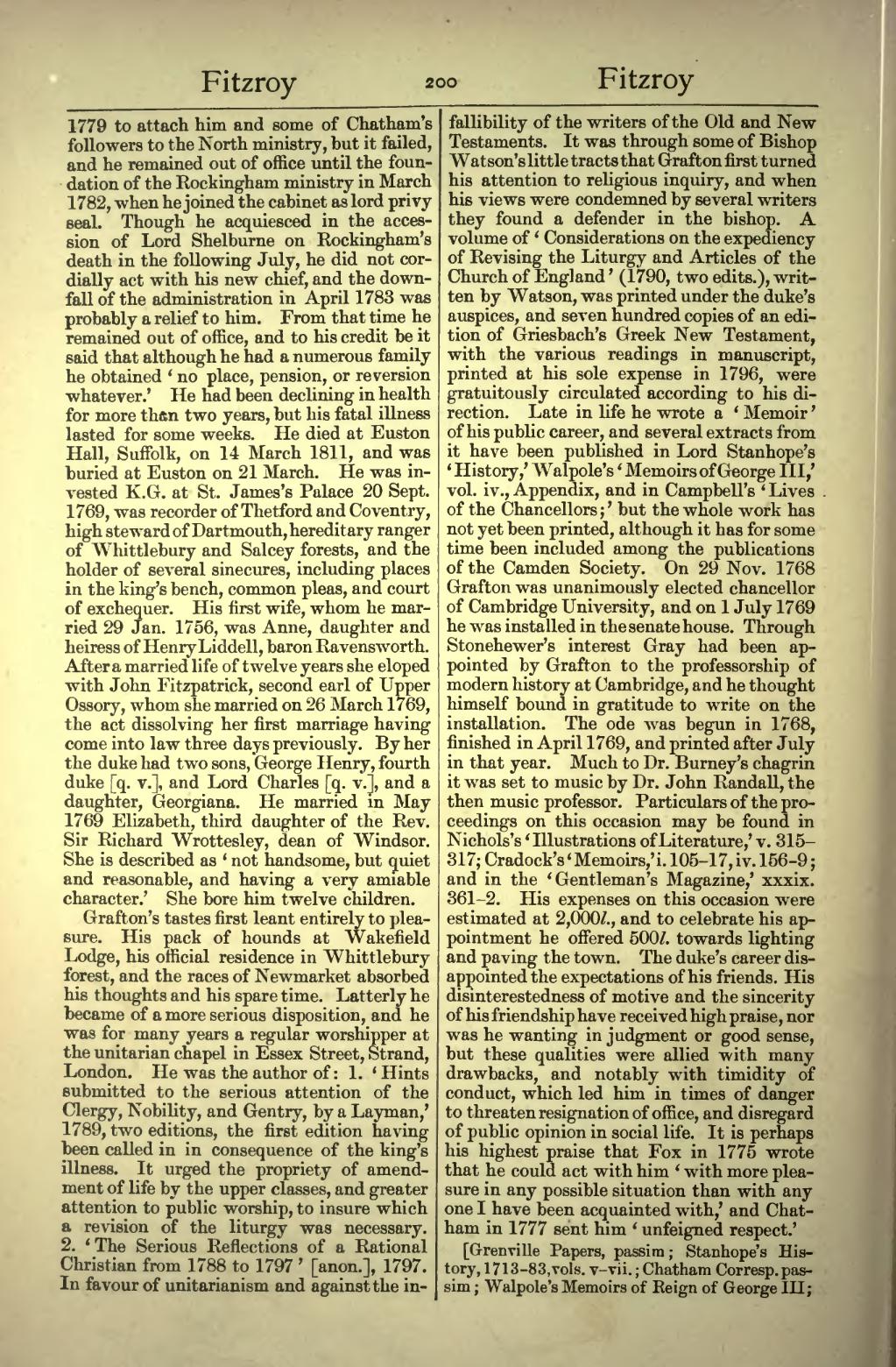1779 to attach him and some of Chatham's followers to the North ministry, but it failed, and he remained out of office until the foundation of the Rockingham ministry in March 1782, when he joined the cabinet as lord privy seal. Though he acquiesced in the accession of Lord Shelburne on Rockingham's death in the following July, he did not cordially act with his new chief, and the downfall of the administration in April 1783 was probably a relief to him. From that time he remained out of office, and to his credit be it said that although he had a numerous family he obtained 'no place, pension, or reversion whatever.' He had been declining in health for more than two years, but his fatal illness lasted for some weeks. He died at Euston Hall, Suffolk, on 14 March 1811, and was buried at Euston on 21 March. He was invested K.G. at St. James's Palace 20 Sept. 1769, was recorder of Thetford and Coventry, high steward of Dartmouth, hereditary ranger of Whittlebury and Salcey forests, and the holder of several sinecures, including places in the king's bench, common pleas, and court of exchequer. His first wife, whom he married 29 Jan. 1756, was Anne, daughter and heiress of Henry Liddell, baron Ravensworth. After a married life of twelve years she eloped with John Fitzpatrick, second earl of Upper Ossory, whom she married on 26 March 1769, the act dissolving her first marriage having come into law three days previously. By her the duke had two sons, George Henry, fourth duke [q. v.], and Lord Charles [q. v.], and a daughter, Georgiana. He married in May 1769 Elizabeth, third daughter of the Rev. Sir Richard Wrottesley, dean of Windsor. She is described as 'not handsome, but quiet and reasonable, and having a very amiable character.' She bore him twelve children.
Grafton's tastes first leant entirely to pleasure. His pack of hounds at Wakefield Lodge, his official residence in Whittlebury forest, and the races of Newmarket absorbed his thoughts and his spare time. Latterly he became of a more serious disposition, and he was for many years a regular worshipper at the Unitarian chapel in Essex Street, Strand, London. He was the author of : 1. 'Hints submitted to the serious attention of the Clergy, Nobility, and Gentry, by a Layman,' 1789, two editions, the first edition having been called in in consequence of the king's illness. It urged the propriety of amendment of life by the upper classes, and greater attention to public worship, to insure which a revision of the liturgy was necessary. 2. 'The Serious Reflections of a Rational Christian from 1788 to 1797' [anon.], 1797. In favour of unitarianism and against the infallibility of the writers of the Old and New Testaments. It was through some of Bishop Watson's little tracts that Grafton first turned his attention to religious inquiry, and when his views were condemned by several writers they found a defender in the bishop. A volume of 'Considerations on the expediency of Revising the Liturgy and Articles of the Church of England' (1790, two edits.), written by Watson, was printed under the duke's auspices, and seven hundred copies of an edition of Griesbach's Greek New Testament, with the various readings in manuscript, printed at his sole expense in 1796, were gratuitously circulated according to his direction. Late in life he wrote a 'Memoir' of his public career, and several extracts from it have been published in Lord Stanhope's 'History,' Walpole's 'Memoirs of George III,' vol. iv., Appendix, and in Campbell's 'Lives of the Chancellors ;' but the whole work has not yet been printed, although it has for some time been included among the publications of the Camden Society. On 29 Nov. 1768 Grafton was unanimously elected chancellor of Cambridge University, and on 1 July 1769 he was installed in the senate house. Through Stonehewer's interest Gray had been appointed by Grafton to the professorship of modern history at Cambridge, and he thought himself bound in gratitude to write on the installation. The ode was begun in 1768, finished in April 1769, and printed after July in that year. Much to Dr. Burney's chagrin it was set to music by Dr. John Randall, the then music professor. Particulars of the proceedings on this occasion may be found in Nichols's 'Illustrations of Literature,' v. 315- 317; Cradock's 'Memoirs,' i. 105-17, iv. 156-9 ; and in the 'Gentleman's Magazine,' xxxix. 361-2. His expenses on this occasion were estimated at 2,000l., and to celebrate his appointment he offered 500l. towards lighting and paving the town. The duke's career disappointed the expectations of his friends. His disinterestedness of motive and the sincerity of his friendship have received high praise, nor was he wanting in judgment or good sense, but these qualities were allied with many drawbacks, and notably with timidity of conduct, which led him in times of danger to threaten resignation of office, and disregard of public opinion in social life. It is perhaps his highest praise that Fox in 1775 wrote that he could act with him 'with more pleasure in any possible situation than with any one I have been acquainted with,' and Chatham in 1777 sent him 'unfeigned respect.'
[Grenville Papers, passim ; Stanhope's History, 1713-83, vols. v-vii. ; Chatham Corresp. passim ; Walpole's Memoirs of Reign of George III;
